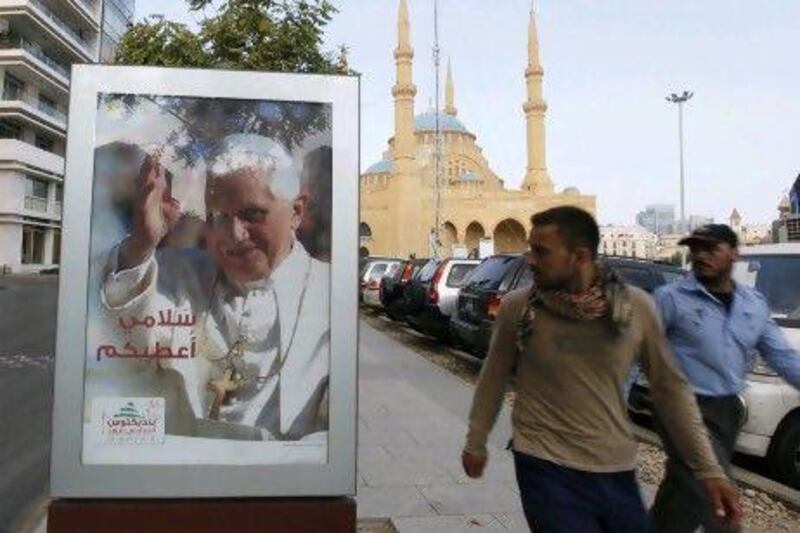BEIRUT // When Pope Benedict XVI sets foot in Lebanon on Friday, he is expected to venture on to delicate and uncertain terrain - namely, how to stem the flow of Arab Christians from the region in which their religion was born.
During this three-day visit to the Lebanese capital, the pontiff will, of course, do what is expected of the leader of the Roman catholic church, the world's largest Christian denomination. He will urge an end to fighting in Syria and plead for coexistence between Christians and Muslims in the Middle East.
Nevertheless, it is the future of Christians in the Arab world that will preocuppy the concerns of the 85-year pope during his visit to Lebanon, according to Catholic clergy.
The flight of Lebanese and other citizens of Middle East nations is not a new phenomenon nor is it confined to Christian communities. Yet in recent decades, a combination of factors appears to have fuelled increased migration of Arab Christians abroad, including poor economic conditions, fears of persecution and instances of abuse.
The war in Syria and its increasingly sectarian overtones have only added to the worries of Christian communities in that country and neighbouring Lebanon, causing them to reconsider their security.
There are 18 recognised religious communities in Lebanon, where deep divisions exist between those supporting the uprising in Syria and those who support the regime of the president, Bashar Al Assad.
Father Abdo Abou Kassm, the director of the Catholic information centre in Beirut, believes Pope Benedict's visit is all the more "necessary at this time".
"He comes to tell all Christians that they should stay, that they have a mission, that they should not go abroad, they must protect their area. That they are the parents of this area and they are from here," he said.
There are an estimated 13 million Christians across the Arab world. Lebanon is home to as many as 1.5 million Christians of various denominations, including Maronites, Melkite Greek Catholics and Armenian Catholics. They make up about 35 per cent of the population.
While anecdotal evidence is plentiful, reliable statistics for Christian emigration from the Middle East are elusive, partly because of the political sensitivity of the subject. But Father Nagi Edelby, a professor in the religious studies department at Beirut's St Joseph's University, said it was a "reality" that the number of Christians in the region was dropping.
"This is not new, but the Christian community is facing many difficulties, including wars and emigration," he said.
Father Nagi and others have stressed the need for Christians in the region to be viewed as integral to its fabric.
"The most important message the pope will give is one of peace and of the importance of the existence of Christians in the Middle East and the role they must fulfil. This is our homeland," he said. "The pope is coming to help us think over this situation in order to find the theological significance of our presence and encourage us to remain in the Middle East."
It will be the pope's first visit to Lebanon - his predecessor, Pope John Paul II, travelled here in 1997. The highlight will be an open-air Mass along Beirut's waterfront on Sunday. He is also due to to meet Lebanese political and religious figures, including Muslim leaders.
Local media have reported discussions between Christian leaders and Hizbollah officials, but there has been no confirmation of a meeting between the pope and the leader of the Lebanese Shiite group, Hassan Nasrallah.
Patriarch Gregory III Laham, the spiritual leader of Lebanon's Melkite Greek Catholic Church - the country's second-largest Catholic community - is expected to call on the Vatican to recognise a Palestinian state.
With the civil war raging next door in Syria, concerns have been raised about security during the papal visit. However, the pope's envoy to Beirut, Archbishop Gabriele Caccia, says the Vatican has been given safety guarantees.
Lebanese authorities have announced a temporary ban on the possession of firearms during the pontiff's visit, except for security personnel assigned to political and religious officials.





